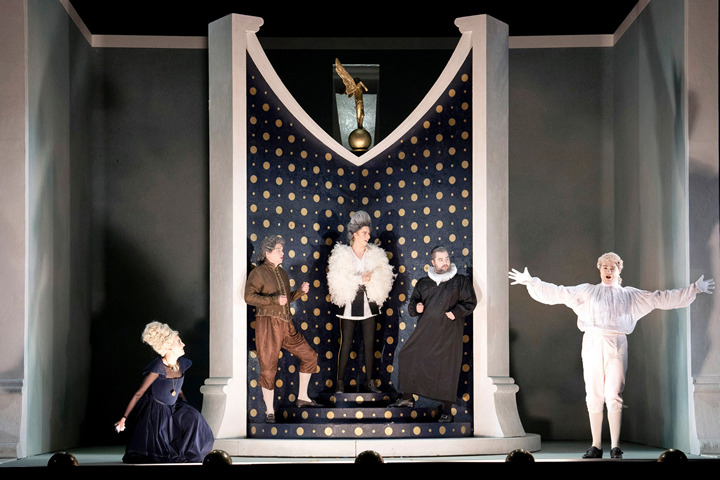| Opera Reviews | 28 April 2024 |
Devious yet delicious, Paula Sides makes the most of Agrippinaby Catriona Graham |
|
Handel: Agrippina |
|
 |
|
|
No-one could confuse Agrippina with a nice woman; politely, she is/was a conniving female dog, using her erotic capital to get her own way at the top of the Roman Empire In James Conway’s final Handelfest for English Touring Opera, Bradley Travis has clearly enjoyed himself reviving Conway’s production of Handel’s Agrippina to Grimani’s libretto. Set in mock-baroque dress, with wigs, powdered faces and much throwing of attitudes, it shows us a number of rather pompous and posturing men, led by their sexual desires and outwitted by a couple of women. Paula Sides makes the most of Agrippina’s devious ways, singing deliciously but undercutting the sincerity of her every utterance with the myriad smiles and grimaces of her very expressive face. She dominates the stage in her blue velvet gown, except when she discards the skirt to reveal fetching yellow trousers, as she triumphantly sings about ‘sailing homeward’ (Ogni vento ch'al porto la spinga), thinking all her scheming has come to fruition. Nerone, her son, has clearly inherited the scheming trait, and Esme Bronwen-Smith’s precocious teenager is knowing and devious, and after anything in a skirt, including his mother. Ottone, on the other hand, for all he saved Claudio’s life, is a bit of a wimp, easy prey for Agrippina’s plans, only coming into his own in Tim Morgan’s strong rendition of Voi che udite il mio lamento lamenting his rejection by those he considered his friends and his lover. Meanwhile Edward Hawkins is a haughty Claudio, keen to keep his dignity even when trying to seduce Poppea. He is somewhat impulsive and gullible; having made Ottone his heir for saving his life, he condemns him on Agrippina’s word that Ottone has tried it on with Poppea. Hilary Cronin’s Poppea is initially a pawn of Agrippina and the men, but then she sees her chance and comes up with her own plan to thwart the conniving Agrippina. After Claudio has sung a love-song, apparently to her toes, she does violence with secateurs to the bouquet of red roses he brought. Then there are the two amigos, Pallante and Narciso, courtiers and rivals for Agrippina’s affection, whom she tries to play off against each other - and everyone else, really. Jerome Knox and Matt Paine, as the martial and ecclesiastical courtiers respectively, are gloriously ingratiating. Meanwhile, echoing the Cupid on the top of Samal Blak’s revolving interiors, Edward Jowle’s wingless messenger is fetchingly dressed in sweety-pink breeches and shirt and most particularly given to posturing, usually with the smuggest of smiles. Throughout Tim van ‘t Hof’s subtle lighting indicates changes of time and place with washes of colour. As Agrippina’s scheming unravels, entrances with bad tidings are presaged by huge shadows. Leo Duarte conducts The Old Street Band with vigour, fairly skipping along in Agrippina’s aria Ho un non sò che nel cor. The band comes into its own in the Sundry Dances which end the performance and merge into the curtain calls. There is an element of camp in this production, which does not take itself too seriously, which befits an opera first performed during the Venetian Carnival. |
|
Photo © Richard Hubert Smith |
|







